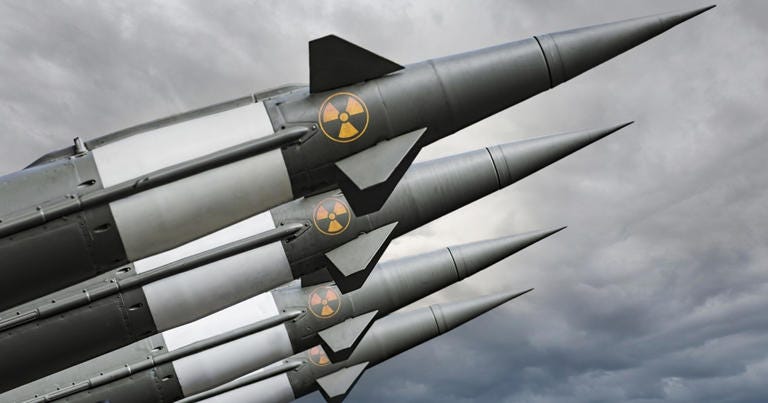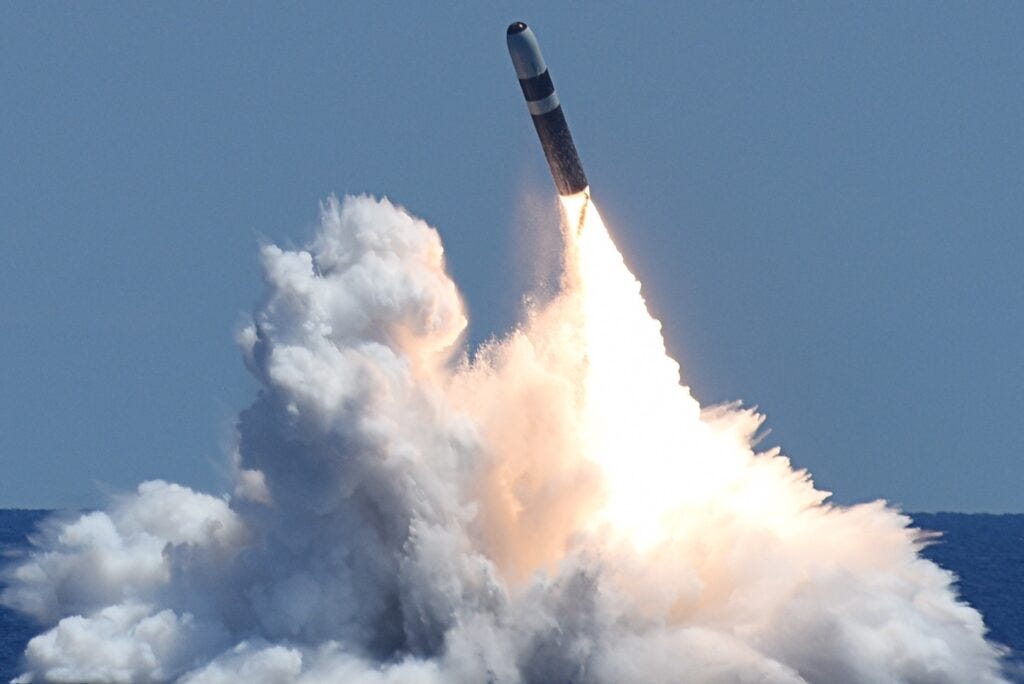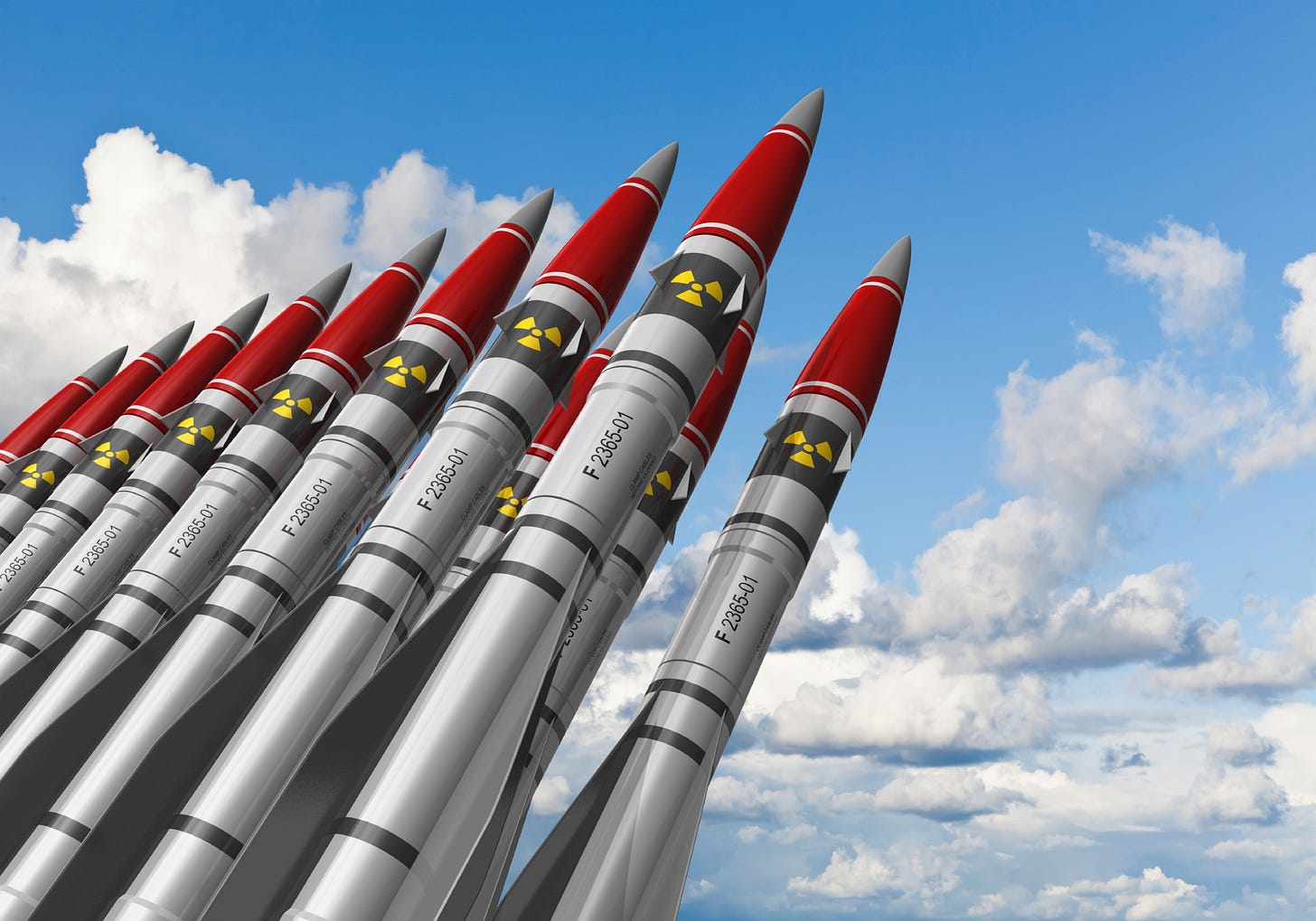Iran is the Tipping Point
We're about to see the nuclear proliferation genie come out of the bottle
First we got the bomb and that was good,
'Cause we love peace and motherhood.
Then Russia got the bomb, but that's O.K.,
'Cause the balance of power's maintained that way!
Who's next?France got the bomb, but don't you grieve,
'Cause they're on our side (I believe).
China got the bomb, but have no fears
They can't wipe us out for at least five years!
Who's next?Then Indonesia claimed that they
Were gonna get one any day.
South Africa wants two, that's right:
One for the black and one for the white!
Who's next?Egypt's gonna get one, too,
Just to use on you know who.
So Israel's getting tense,
Wants one in self defense.
"The Lord's our shepherd, " says the psalm,
But just in case, we better get a bomb!
Who's next?Luxembourg is next to go
And, who knows, maybe Monaco.
We'll try to stay serene and calm
When Alabama gets the bomb!
Who's next, who's next, who's next?
Who's next?-Who’s Next by Tom Lehrer (written in 1965)
There is a general conception that having atomic weapons makes your nation immune to wars of aggression; that the most anyone will do is the sort of gradual political destabilization, proxy wars, and economic threats that are regularly pointed at Russia, North Korea, or Israel. Border skirmishes between nuclear states are … uncommon - the canonical example is mostly India and Pakistan, and while this is far from a depiction of broad peaceful it also is certainly less bloody than all-out war might be. So perhaps the mutually-assured-destruction detente holds?
The theory, then, is that Iran wants The Bomb because - as the worst kept secret ever goes - the Israelis have it. And the murderous theocrats in Iran, having overthrown the Shah back in 1979, have been trying to advance their own power by provoking a fight with Israel ever since (and also subverting Iraq, destabilizing the Kingdom of Saudi Arabia, and funding insurgent groups throughout the region). Thus, they’ve sponsored various proxy war groups in the region to cause trouble for the Israelis and incidentally all the Sunni Muslims - Iran being predominantly Shia - and this has been a series of bloodbaths for decades. Iran’s murder minions of late consists of Hamas (subjugating Gaza), Hezbollah (in Lebanon), and the Houthis (in Yemen) - from the Iranian perspective, all useful expendible dysgenic idiots who can be sent to die for the sake of doing battle with the enemy, hopefully inflicting some casualties, and raising public support against Israel (and against their other political rival, the Saudis, de facto leaders of the Sunni faction of Islam as they control immense wealth and the Islamic holy cities of Mecca and Medina). In some cases it’s worked - lots of extremely short-sighted left-wingers concluded “oh, we should support Palestine and Hamas because we hate Israel and they hate Israel” without realizing “the Palestinians and the Iranians hate the American Left too”. As much as Team America: World Police is an exceedingly lowbrow take on American culture, the line “Our intelligence has been suicide bombed by a giant socialist weasel” pretty well nailed it.
So there’s been some efforts for decades to keep Iran (and other Middle Eastern powers) from successfully pursuing a nuclear weapons program. Usually this has been varying degrees of diplomacy, graduating to the use of sabotage against nuclear enrichment programs, and often airstrikes against reactor facilities that were likely to be used to produce weapons-grade uranium or plutonium - the necessary material to make an atomic bomb. A Syrian nuclear facility was destroyed by the Israelis in 2007, similarly the Israelis destroyed an Iraqi reactor in 1981 - in both cases by air attack. In circa 2010, the Stuxnet attack was a particularly convoluted bit of cyberwarfare that sabotaged the Iranian uranium enrichment by damaging the centrifuges used for isotope separation.
But the Iranians have been persistent, and have gone to a great deal of trouble to rebuild their nuclear program both far away from Israel and buried deep to make it difficult for an air strike to bomb it. Under significant stress from foreign sanctions, they are determined to make sure they can achieve this goal if they deem it necessary. And despite sabotage efforts from Mossad and the more-than-occasional asssassination of Iranian scientists and researchers working on the nuclear weapons program, it does appear that Iran is quite close to the day when they could in fact detonate their own atomic bomb. So then what?
Well, I suggest that the answer of “then what” is an uneasy peace for Iran - though, as far as I can tell, Iran has an uneasy peace already; I do not think Iran will be greatly empowered to expand its own sphere of influence by conquest and it does not appear any of its neighbors was about to invade Iran. But almost immediately, the outcome is likely to be a spate of nuclear proliferation beyond what we’ve ever seen.
Iran has two immediate neighbors who are going to view this as an existential threat - or, more precisely, two immediate neighbors who are not currently nuclear powers. (Pakistan, Russia, China, and of course Israel are all in the Nuclear Armed Powers club already.) But I would expect that Turkey and Saudi Arabia will both regard this with deep alarm, and both have sufficiently deep pockets that I would expect them to be able to build or acquire at least a small nuclear arsenal of their own to serve as a deterrent to Iranian ambitions. And given Iranian history of supporting terrorism, there are likely to be some fairly unequivocal threats about any sorts of nuclear terrorism being explicitly treated as an act of war by Iran, which is in turn likely to be an unpleasant tripwire for escalation.
But surely, seeing this kind of proliferation take place, the rest of the world will not sit idle and think “oh, it’s just those wacky madmen in the Middle East, we can trust them with The Bomb,” what could go wrong?
No, the next state to nuclearize is likely to be Ukraine rearming (since, after all, they had nuclear weapons before - they gave them up as part of a treaty pact, generally referred to as the Budapest Memorandum, where the US and Russia agreed to respect and defend their borders, and having seen how that has gone, they have undoubtedly kicked themselves many times) - there’s the fairly simple premise that Putin would not likely have invaded Ukraine if they had the ability to lob a nuke into Moscow.
But probably in parallel to that, you’re likely to see Poland, Taiwan (who nearly built them in 1967, and then again in the 1980s), South Korea, and even Japan wanting nuclear weapons for exactly the same reason: it’s a very effective way to discourage hostile nuclear neighbors. Though I suspect the government in Beijing already regrets providing Pakistan’s A.Q. Khan with the designs for nuclear weapons which then in turn proliferated to North Korea, Iran, and Libya - but if those weapons end up pointed back at China, that will seem to be extremely counterproductive. And if NATO does end up standing relatively alone - without a presumptive United States nuclear umbrella - they are unlikely to want France to be the only nuclear power in the European Union, either you’ll see a warming of relations with the United Kingdom and perhaps some reversal of Brexit, or perhaps if Germany has to reactivate their reactors rather than buy natural gas from Russia they may also decide that they also need nuclear weapons. (Surely, no one will be alarmed by the prospect of a nuclear-armed Germany.)
As perhaps edge cases, two more nominations: Australia has committed to acquiring nuclear-powered submarines; it’s not beyond the realm of possibility that they could extend to similarly arming them… though, at this point, that doesn’t appear to be in the cards unless the global situation greatly deteriorates. And, of course, South Africa had at one point demonstrated the ability to produce nuclear weaponry and is the only nation known to have done so and then disarmed - I differentiate this from Ukraine, whose weapons were produced as part of the Soviet Union and inherited from the dissolution of that larger nation, but who then also disarmed - who could theoretically rearm, but in practice is unlikely to.
Once proliferation starts in earnest, however, the arms dealers may be out in force. Noah Smith writes that Japan, South Korea, and Poland need nuclear weapons immediately and makes the point that they will deter the immediately menacing neighboring superpowers - and also spells out how China sold the blueprint (and do-it-yourself-kit for the first two bombs) to Pakistan and then Pakistan did the same for Libya, Iran, and North Korea; likewise France helped Israel and apparently Israel similarly worked with South Africa. Is it implausible that Pakistan might not also arm its fellow Muslim brethren in Egypt, or Saudi Arabia, or Syria, or Turkey, or Libya again, or even the UAE or Qatar if they were overly concerned about Iranian aggression? Pakistan, after all, might very much benefit from an influx of cash or petroleum from some of the wealthier states. And North Korea might make the same sorts of deals, even if the Muslims would tend to prefer to deal with their brothers in the faith - certainly missile designs have been exported in the past.
How can I save my little boy
From Oppenheimer's deadly toy?
There is no monopoly of common sense
On either side of the political fence
We share the same biology
Regardless of ideology
Believe me when I say to you
I hope the Russians love their children too
-Sting
It is metaphorically said that you can’t unring a bell - and what attempts have been made to keep nuclear weapons from proliferating have thus far been more successful than might otherwise have been expected. But a move towards a more isolationist world leaves the United States - and everyone - with less ability to intervene on this front, and de facto encourages nuclear proliferation. It is an unintended consequence of an America First policy that if we decide to go it alone and leave the rest of the world to their own devices - that many nations will look at their larger or more bellicose neighbors and choose nuclear devices as a means to preserve detente. And for a time, that may hold - but as we’ve seen, nations rise and fall, governments change quickly, and there’s the increasing prospect that these may fall into the wrong hands with a rise in global social instability - and that we won’t know who is responsible. Nuclear terrorism has been a movie plot for decades - but let’s not make it easier for the bad guys.







Hat tip to Rajeshswari, who notes that the BBC seems confident that the Saudis have already purchased but not yet taken possession of Pakistani nuclear weapons.
https://www.bbc.com/news/world-middle-east-24823846